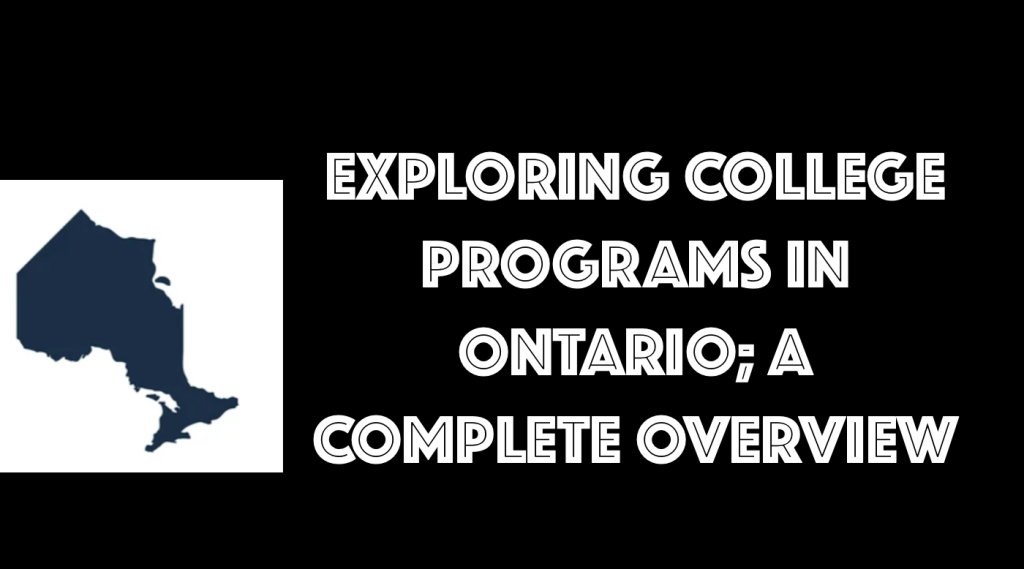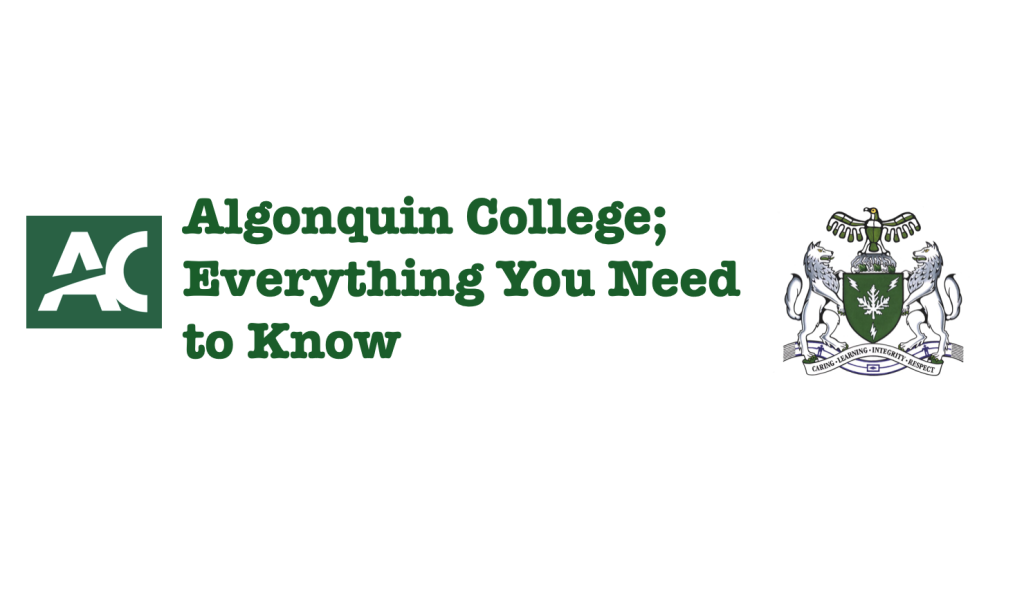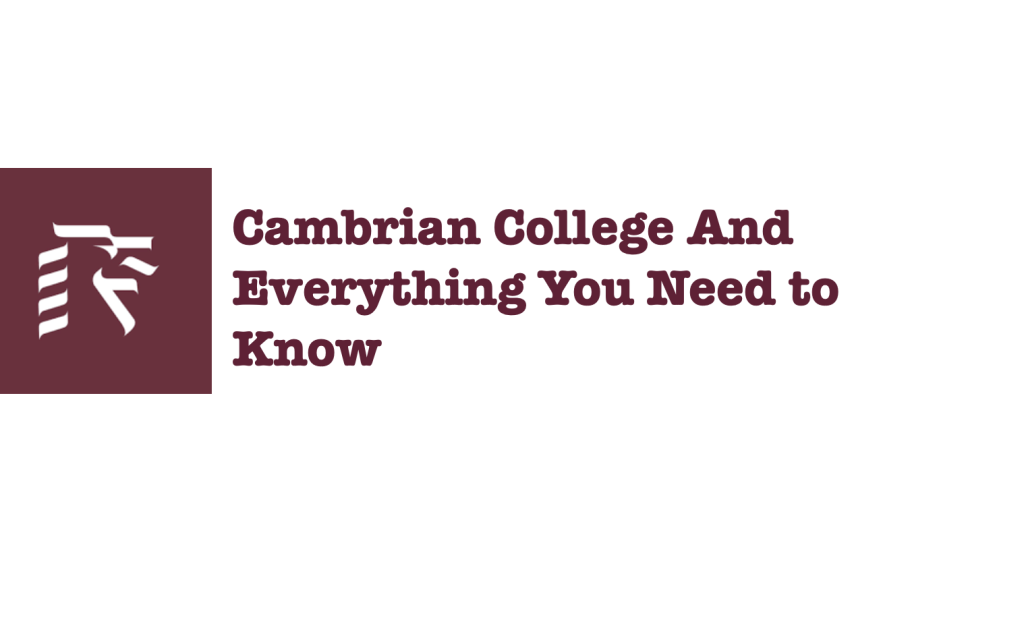College education in Ontario offers a multitude of opportunities for students to acquire practical skills and knowledge in their chosen fields. With a wide range of program options and career-focused curriculum, colleges provide a pathway to professional success and personal growth. In this article, we will provide a comprehensive overview of college programs in Ontario, covering various aspects from program types and admission requirements to financial considerations and student support services.
Table of Contents
A Complete Overview; Exploring College Programs in Ontario
Introduction to College Education in Ontario:
College education plays a crucial role in the Ontario education system, offering a practical and hands-on approach to learning. Unlike universities, which focus more on theoretical knowledge, colleges emphasize applied skills and experiential learning. By aligning their programs with industry standards and employer needs, colleges prepare students for the workforce.
Read Also: Factors to Consider When Choosing the Right College
Types of College Programs:
Ontario colleges offer a wide variety of programs to cater to diverse career interests. Students can choose from diploma programs, certificate programs, and postgraduate programs. Each program type has its own unique benefits and duration. Diploma programs generally offer comprehensive training in a specific field, while certificate programs focus on specialized skill development. Postgraduate programs are designed for students who already have a university degree and wish to further specialize in a particular area.
Diploma programs are typically two to three years in duration and provide a well-rounded education combined with practical training. These programs cover a wide range of disciplines, including business, technology, healthcare, arts, sciences, and trades. Students acquire specialized knowledge and skills relevant to their chosen field, preparing them for entry-level positions or further education.
Certificate programs are shorter in duration, typically ranging from several months to one year. They offer focused training in specific areas and are ideal for individuals seeking to upgrade their skills or enter a new field quickly. Certificate programs often cater to niche industries or emerging sectors, providing specialized knowledge and practical skills.
Postgraduate programs are available for students who have already obtained a university degree and wish to gain specialized skills or knowledge in a specific area. These programs offer advanced training and can enhance career prospects or facilitate a career change.
Admission Requirements and Application Process:
Admission requirements for college programs in Ontario vary depending on the specific program and college. Generally, applicants are required to have a high school diploma or equivalent. Some programs may have specific prerequisite courses or additional requirements, such as portfolios or interviews. It is important to research the admission requirements and application deadlines for the programs of interest.
To apply for college programs in Ontario, students typically submit an application through the Ontario Colleges Application Service (OCAS) or directly to the college of their choice. The application process may include submitting academic transcripts, personal statements, reference letters, and other supporting documents. It is important to carefully follow the application instructions and ensure all required materials are submitted by the specified deadlines.
Find how to apply Ontario Colleges at the “How To Apply” page.
Choosing the Right College Program:
Choosing the right college program is a crucial step in shaping a student’s career path. Factors to consider include personal interests, career goals, aptitudes, and program reputation. Researching colleges and their program offerings, faculty qualifications, industry connections, and facilities can help students make an informed decision. Additionally, speaking with current students or alumni, attending college information sessions, or visiting campuses can provide valuable insights.
Consider your passions and areas of interest when selecting a program. Reflect on your career goals and the skills you want to acquire. Look for programs that align with your aspirations and offer the necessary training for your desired field. Research the employment prospects and demand for graduates in your chosen industry to ensure there are opportunities available upon program completion.
It is also beneficial to explore colleges with a strong reputation in your field of interest. Look for colleges that have industry partnerships, cooperative education programs, or faculty members with relevant industry experience. The college’s facilities, resources, and student support services should also be taken into consideration.
College Pathways and Articulation Agreements:
One of the advantages of attending college in Ontario is the opportunity to pursue further education at the university level. Many colleges have established pathways and articulation agreements with universities, allowing students to transfer their college credits towards a university degree. Students should explore these pathways and agreements to ensure a smooth transition if they plan to pursue higher education in the future.
Pathways between colleges and universities facilitate the transfer of credits earned in a college program towards a university degree program. The specific requirements and agreements vary, so it is important to research and understand the transfer options available. By successfully completing a college program and meeting the transfer requirements, students can continue their education at a university while receiving credit for their prior college coursework.
Articulation agreements are formal agreements between colleges and universities that outline the specific credits or courses that will be recognized by the university when a student transfers. These agreements provide a clear pathway for students to progress from a college program to a related university program. It is important to review and understand the details of the articulation agreements to maximize the credit transfer process.
Financial Considerations and Scholarships:
Financing college education is an important aspect to consider. Tuition fees, textbooks, and living expenses can add up, but there are various financial aid options available. Students can explore student loans, grants, and scholarships specifically designed for college students in Ontario. It is advisable to research and apply for scholarships early to increase the chances of receiving financial assistance.
Start by understanding the tuition fees for your chosen college program. Ontario colleges have different fee structures, so compare the costs of different programs and colleges to determine the most affordable options. Additionally, consider the cost of living, transportation, and other expenses associated with attending college.
To alleviate the financial burden, students can explore government student loan programs, such as the Ontario Student Assistance Program (OSAP), which provides financial aid based on financial need. Scholarships and bursaries are also available, awarded based on various criteria such as academic achievement, community involvement, or specific demographics. Research and apply for scholarships that align with your qualifications and interests.
College Facilities and Student Support Services:
Colleges in Ontario offer state-of-the-art facilities and resources to enhance the learning experience. These can include well-equipped labs, libraries, industry-specific equipment, and technology. Additionally, colleges provide a range of student support services, such as academic advising, career counseling, and job placement assistance. Students should take advantage of these resources to maximize their college experience and prepare for their future careers.
When researching colleges, consider the facilities and resources available. Look for colleges that have modern facilities and industry-standard equipment relevant to your program of interest. Access to well-stocked libraries, computer labs, and specialized facilities can greatly enhance the learning experience.
Student support services are also vital for academic success and personal well-being. Seek colleges that offer comprehensive academic advising to help plan your course selection and program progression. Career counseling services can assist in exploring career options, developing job search strategies, and connecting with potential employers. Job placement assistance programs can help students secure relevant work placements or co-op opportunities to gain practical experience in their field.
Work-Integrated Learning and Co-op Programs:
Work-integrated learning is a cornerstone of college education in Ontario. Many college programs include co-op placements, internships, or industry projects that allow students to gain practical experience in real work environments. These opportunities provide invaluable hands-on training, industry connections, and an understanding of workplace dynamics.
Co-op programs are structured programs that integrate classroom learning with paid work experience. They provide students with the opportunity to apply their knowledge and skills in aprofessional setting, gain industry experience, and build a network of contacts. Co-op placements can range from a few months to a year, depending on the program and the specific requirements.
Internships, on the other hand, are typically shorter in duration and may or may not be paid. They provide students with a chance to gain practical experience and make industry connections. Internships can be part of the curriculum or pursued independently during breaks or after completing a program.
Industry projects are collaborative initiatives between colleges and external organizations. Students work on real-world projects, solving problems and addressing industry challenges. These projects allow students to apply their skills, gain practical experience, and contribute to the industry.
Work-integrated learning experiences offer numerous benefits to students. They bridge the gap between theory and practice, allowing students to develop practical skills, adapt to professional environments, and build a professional portfolio. Moreover, they often serve as valuable networking opportunities and can lead to job offers or future employment prospects.
Success Tips for College Students:
To thrive in college, students can adopt various success strategies. Developing effective study habits, time management skills, and organizational techniques are essential for managing coursework and assignments. It is also important to utilize academic support services, seek help when needed, and actively participate in class discussions and group projects. Networking, participating in extracurricular activities, and building professional connections can also contribute to future career prospects.
Utilize the resources and support services available at your college, such as tutoring centers, writing labs, and academic advisors. Take advantage of workshops or seminars on study skills, time management, and exam preparation. Establishing connections with classmates, forming study groups, and engaging in collaborative learning can enhance the college experience and foster a supportive academic community.
It is also important to maintain a healthy work-life balance. College can be demanding, but allocating time for relaxation, hobbies, and social activities is crucial for overall well-being. Seek out extracurricular activities, clubs, or student organizations related to your interests and passions. Engaging in these activities can broaden your horizons, develop new skills, and provide opportunities for personal growth and networking.
Conclusion
Exploring college programs in Ontario offers students a diverse range of opportunities to pursue their passions, gain practical skills, and embark on successful careers. By understanding program types, admission requirements, financial considerations, and student support services, students can make informed decisions and set themselves up for a rewarding college experience. With the right program choice, dedication, and active engagement, college education in Ontario can be a transformative stepping stone towards a fulfilling professional future. Remember to thoroughly research your options, seek guidance when needed, and make the most of the resources available to you.




Pingback: Transitioning from High School to College: Tips for Ontario Students - Schools in Ontario